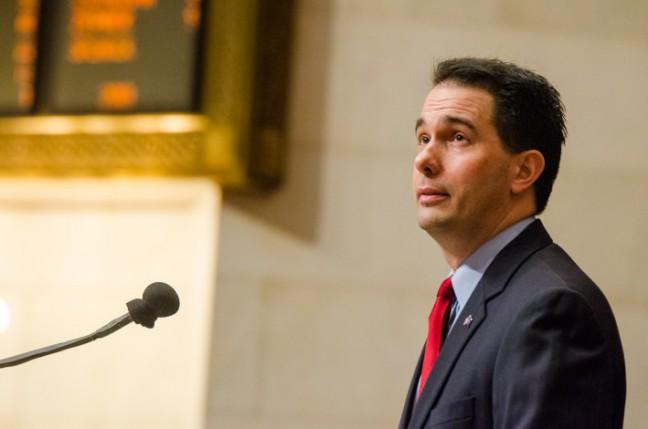Gov. Scott Walker signed into law Friday a bill to limit what kinds of crimes John Doe investigations can look into — ensuring they can’t be used in cases of possible political corruption and misconduct.
The bill also puts a maximum six-month time limit on the investigations, Walker’s statement said.
Rep. David Craig, R-Big Bend, authored the bill, which the Assembly passed in a 60-36 party-line vote Tuesday. The Senate also passed the bill Tuesday in an 18-14 vote.
Assembly Democrats refer to the legislation as the “Corrupt Politician Protection Act.”
Walker himself was subject to a John Doe investigation for his 2012 recall election, where he was accused of illegally coordinating with conservative groups to raise campaign funds.
The Wisconsin Supreme Court dismissed the case in July on grounds that campaign finance laws were too broad to accuse Walker of breaking rules in his campaign spending, according to the Milwaukee Journal Sentinel. In the ruling, the judge found the collaboration between campaigns and issue groups was not illegal under current law.
The Assembly also passed a bill Wednesday to alter campaign finance law, allowing for looser campaign contribution and disclosure restrictions, as well as easier coordination between candidates, parties and groups.
Assembly Republicans all approved the campaign finance bill while Democrats recused themselves on grounds their campaign committees had a financial interest.
Rep. Jim Ott, R-Mecquon, said at the hearing Wisconsin had a unique use of John Doe compared to any other state.
He said the John Doe investigations ruined people’s reputations and terrorized families, which is why Republicans want to revamp them.
“The way [the John Doe law] is in Wisconsin right now — the only state that has a law like that — is ripe for abuse,” Ott said.
But Rep. Christine Sinicki, D-Milwaukee, accused Republicans of creating the John Doe bill based on their own desires, not constituents’ needs.
“This [bill] does not do anything for the people in the state of Wisconsin,” Sinicki said.
Michael Wagner, a professor in University of Wisconsin’s School of Journalism and Mass Communication, specified the law changes regulations on investigations that affect public officials, as well as certain cases of identity theft and lower-level drug dealers.
Wagner said the general public would likely notice the difference in how the state investigates politicians. He expects an increase in grand jury investigations, which are not done often in Wisconsin.
“People will notice the change in terms of the process by which the people are able to hold lawmakers accountable for their behavior,” he said.
Wagner said now that the law is in place, prosecutors will not be able to start any new John Doe investigations on public officials.


